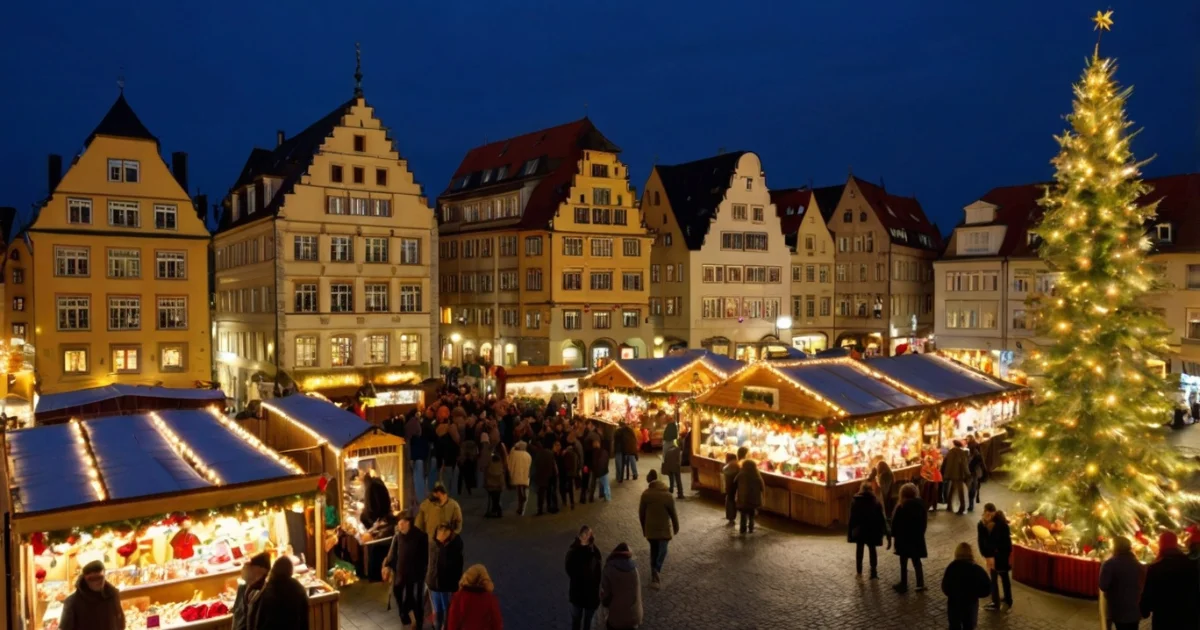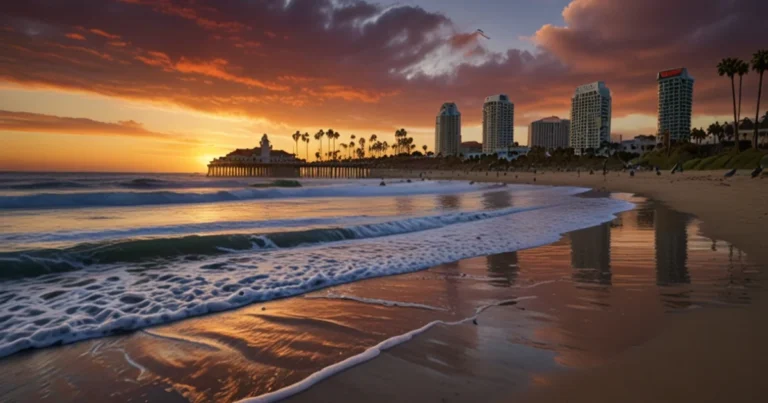15 Top Rated Christmas Markets in Germany
Introduction
The holiday season is magical, but there’s something about Christmas in Germany that takes it to another level. Imagine cobblestone streets dusted with snow, the scent of roasted almonds and mulled wine filling the air, and the sounds of carolers spreading festive cheer. German Christmas markets, or Weihnachtsmärkte, are world-renowned for their charm, history, and unique offerings. With each market having its own special character, it’s no wonder that Germany is the go-to destination for Christmas market enthusiasts. Let’s dive into the 15 top-rated Christmas markets in Germany, each promising a memorable experience.

1. Christkindlesmarkt, Nuremberg
Nuremberg’s Christkindlesmarkt is not just one of Germany’s oldest Christmas markets; it’s also one of the most famous. With roots dating back to the 16th century, this market is steeped in tradition. Each year, the event kicks off with the ceremonial opening by the “Christkind,” a young girl dressed as an angel, who delivers a prologue from the balcony of the Frauenkirche. Visitors are drawn to the market’s iconic red and white striped stalls, which offer handmade ornaments, wooden toys, and delicious Nuremberg gingerbread (Lebkuchen). Don’t forget to warm up with a mug of Glühwein as you explore this enchanting market.
2. Striezelmarkt, Dresden
Dating back to 1434, Dresden’s Striezelmarkt is Germany’s oldest Christmas market and a beloved destination for both locals and tourists. Named after the Striezel, or Stollen, a traditional Christmas cake, this market is a celebration of Saxon culinary delights and craftsmanship. One of the highlights of the Striezelmarkt is the giant Christmas pyramid, which stands over 14 meters tall and is a symbol of the region. As you wander through the market, be sure to sample some Dresdner Stollen, sip on some warm Eierpunsch (a type of eggnog), and take in the festive atmosphere.
3. Weihnachtsmarkt am Kölner Dom, Cologne
Cologne’s Christmas market, located right next to the stunning Cologne Cathedral, offers a picturesque setting that’s hard to beat. The market’s towering Christmas tree and the backdrop of the Gothic cathedral create a magical ambiance that captivates visitors. Artisans from all over Europe come to this market to sell their wares, from handcrafted ornaments to exquisite jewelry. The market’s central stage hosts live performances, adding to the festive cheer. While you’re there, don’t miss the chance to try the local specialty, Reibekuchen (potato pancakes), served with applesauce.
4. Munich’s Marienplatz Christmas Market
Munich’s Marienplatz Christmas Market, set in the heart of the city, is a quintessential Bavarian experience. Surrounded by historic buildings and the impressive Neo-Gothic town hall, this market offers a cozy yet lively atmosphere. Traditional Bavarian food and drinks, including Bratwurst and Weißbier, are in abundance. One of the highlights is the Kripperlmarkt, a market dedicated to nativity scenes, where you can find everything from handcrafted figurines to elaborate nativity displays. The sounds of Alpine horns and choirs echo through the square, adding to the festive spirit.
5. Frankfurt Christmas Market
Frankfurt’s Christmas market seamlessly blends tradition with a cosmopolitan flair. Set against the backdrop of the Römer, Frankfurt’s historic town hall, this market is known for its stunning Christmas tree and beautifully decorated stalls. Visitors can indulge in local specialties like Bethmännchen (marzipan cookies) and enjoy a cup of hot apple wine, a regional favorite. The market also features an international section where you can find gifts and treats from around the world, making it a unique experience for those looking to explore beyond the traditional German offerings.
6. Stuttgart Weihnachtsmarkt
Stuttgart’s Weihnachtsmarkt is one of the largest in Europe, boasting over 280 beautifully decorated stalls. This market is a blend of tradition and modernity, offering everything from classic Christmas decorations to contemporary crafts. The market is spread across several squares in the city center, each with its unique theme and attractions. One of the highlights is the Finnish Christmas Village, where you can warm up in a traditional sauna or enjoy a cup of Glögi, the Finnish version of mulled wine. Stuttgart’s market is also known for its impressive Advent calendar, displayed on the windows of the Old Castle.
7. Lübeck Christmas Market
Lübeck’s Christmas market is set in the heart of the city’s UNESCO World Heritage-listed old town, making it one of the most picturesque markets in Germany. Lübeck is famous for its marzipan, and no visit to this market is complete without trying some of this sweet treat, often shaped into intricate figures or covered in chocolate. The market’s medieval charm is complemented by its location next to the Gothic St. Mary’s Church and the historic Town Hall. The festive lights reflecting off the River Trave add to the magical ambiance, making Lübeck a must-visit during the Christmas season.
8. Hamburg Christmas Market
Hamburg offers a unique Christmas market experience with its maritime twist. The city’s main market, located in front of the historic Town Hall, is known for its variety of themed sections, including a section dedicated to toy makers and another to artisans from around the world. One of the most unique features of Hamburg’s Christmas season is the Historic Christmas Parade, which takes place on weekends and features festive floats, marching bands, and even Santa Claus himself. The nearby Winterwald (Winter Forest) offers a quieter, more intimate market experience amidst snow-covered trees and cozy fire pits.
9. Rothenburg ob der Tauber Reiterlesmarkt
The Reiterlesmarkt in Rothenburg ob der Tauber is like stepping into a fairy tale. This medieval town, with its well-preserved walls and half-timbered houses, provides the perfect backdrop for a Christmas market. The market is named after the Reiterle, a mythical figure who, according to legend, comes down from the skies to bring the spirit of Christmas to the town. Visitors can enjoy a variety of traditional foods, including Schneeballen (snowballs), a local pastry dusted with powdered sugar. The town’s charm and the market’s festive atmosphere make it a favorite among those seeking a truly enchanting Christmas experience.
10. Berlin Christmas Markets
Berlin, the capital of Germany, is home to numerous Christmas markets, each with its distinct flavor. The Gendarmenmarkt is perhaps the most famous, known for its elegant white tents and stunning backdrop of the Konzerthaus and French Cathedral. Here, you can find high-quality crafts, gourmet food, and live performances that range from classical music to acrobatics. Another must-visit is the Charlottenburg Palace Christmas Market, where the palace is beautifully illuminated, creating a magical setting for the market. With so many markets to choose from, Berlin offers something for everyone, whether you’re looking for traditional crafts or modern Christmas experiences.
11. Leipzig Christmas Market
Leipzig’s Christmas market is one of the largest and oldest in Germany, dating back to 1458. The market is spread across the city center, with the main market located in the historic Market Square. One of the market’s highlights is the Medieval Market, where visitors can step back in time and experience Christmas as it was celebrated in the Middle Ages. Another unique feature is the Finnish Village, where you can warm up by the fire with a cup of Glögi and enjoy traditional Finnish delicacies. The market’s festive atmosphere is enhanced by the beautiful decorations and the sounds of Christmas carols filling the air.
12. Aachen Christmas Market
Aachen’s Christmas market is located near the borders of Belgium and the Netherlands, making it a popular destination for visitors from all three countries. The market is set against the backdrop of Aachen Cathedral, a UNESCO World Heritage site, and the historic Town Hall. Aachen is famous for its Printen, a type of gingerbread that’s a must-try when visiting the market. The market’s cozy atmosphere and charming stalls make it a perfect place to find unique gifts and enjoy the festive spirit. With its international flair and rich history, Aachen’s Christmas market is a true gem in the heart of Europe.
13. Heidelberg Christmas Market
Heidelberg’s Christmas market is set along the city’s main street, with stalls stretching from Bismarckplatz to the famous Heidelberg Castle. The market’s romantic setting, with the Neckar River and the illuminated castle in the background, makes it one of the most beautiful in Germany. Visitors can enjoy traditional treats like Heidelberger Studentenkuß (a local chocolate delicacy) and warm up with a cup of mulled wine as they explore the market’s offerings. The market also features an ice rink, where visitors can skate with the castle as a backdrop, adding to the magical experience.
14. Esslingen Medieval Market and Christmas Market
Esslingen’s Christmas market offers a unique experience with its medieval theme. The market is held in the town’s historic center, where the medieval buildings and cobblestone streets create an authentic backdrop for the market. Visitors can enjoy a variety of medieval-themed activities, including watching fire breathers, jugglers, and blacksmiths at work. The market’s stalls offer traditional crafts and foods, as well as medieval-inspired items like wooden toys and leather goods. The festive atmosphere is enhanced by the sounds of traditional music and the smell of roasting chestnuts, making it a truly immersive experience.
15. Erfurt Christmas Market
Erfurt’s Christmas market is a hidden gem in the state of Thuringia, offering a more intimate and traditional market experience. The market is set in the city’s historic Cathedral Square, with the impressive Erfurt Cathedral and St. Severus Church providing a stunning backdrop. One of the market’s highlights is the giant candle pyramid, which stands at the center of the square and is beautifully illuminated at night. Visitors can enjoy local specialties like Thuringian bratwurst and explore the market’s stalls, which offer a wide range of handcrafted gifts and decorations. Erfurt’s Christmas market is a perfect destination for those looking to experience the charm of a traditional German Christmas market in a more relaxed setting.
Conclusion
Germany’s Christmas markets are more than just places to shop; they are a celebration of the country’s rich traditions, culture, and festive spirit. Each market offers its own unique experience, whether it’s the historic charm of Nuremberg’s Christkindlesmarkt, the medieval magic of Rothenburg ob der Tauber, or the cosmopolitan flair of Berlin. Visiting these markets is like stepping into a winter wonderland, where the sights, sounds, and smells of Christmas come alive. Whether you’re a first-time visitor or a seasoned traveler, Germany’s Christmas markets are sure to leave you with unforgettable memories and a warm holiday spirit.
FAQs
1- What is the Best Time to Visit Christmas Markets in Germany?
Ans: The best time to visit Christmas markets in Germany is from late November to just before Christmas Eve. Most markets open during this period, and visiting in early December allows you to experience the festive atmosphere without the peak crowds.
2- Are German Christmas Markets Family-Friendly?
Ans: Absolutely! German Christmas markets are perfect for families, with activities for children, such as carousel rides, puppet shows, and special events like visits from Santa Claus.
3- What Should I Eat at a German Christmas Market?
Ans: Some must-try foods at German Christmas markets include Bratwurst, Lebkuchen (gingerbread), Glühwein (mulled wine), and regional specialties like Dresdner Stollen or Aachen Printen.
4- Can I Find Unique Gifts at German Christmas Markets?
Ans: Yes, German Christmas markets are known for their handcrafted gifts, including ornaments, toys, jewelry, and festive decorations that you won’t find anywhere else.
5- How Can I Travel Between Different Christmas Markets in Germany?
Ans: Germany’s extensive and efficient train network makes it easy to travel between cities. Consider getting a rail pass if you plan to visit multiple markets, as it offers flexibility and convenience.






